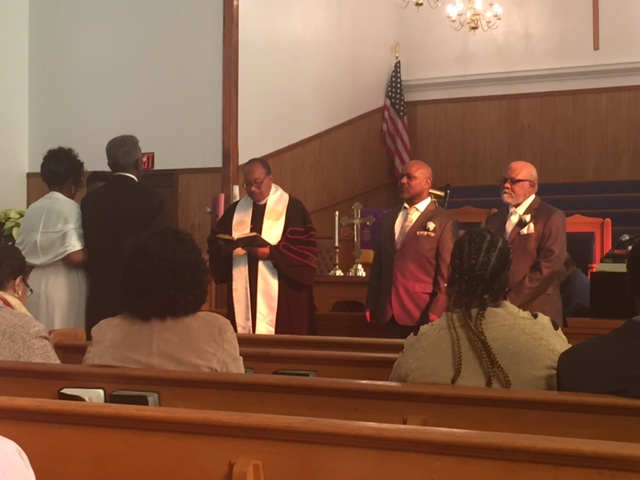By LEE JOHNSON | Nashville Voice
I had waited almost a decade – nine years and 11 months, to be exact.
So I didn’t mind taking off from my job in Nashville, Tennessee and driving three hours to pick up my cousin Harold from the Northwest Correctional Complex in Tiptonville, Tennessee.
In a way, I too was being released.
When Harold and I were both nine years old, we watched our older cousins get high. They would often let Harold take puffs just to see his reaction. But they never let me smoke. It was as if our fates depended on their misconstrued judgments.
Even though I was as young as Harold, a guilty feeling haunted me over the years when I thought about how I did nothing to try to prevent him from smoking. I just watched him through the smoke that was growing between us, separating us as our lives went in different directions.
I eventually went off to college. Harold looked to the mean streets of Binghampton in Memphis, Tennessee, for his education.
As he got older, Harold’s drug usage escalated. He began using crack cocaine and became addicted. To support his habit, he burglarized several homes and even robbed a drug dealer.
By the time he was 24, Harold had been locked up four times. However, his longest stint came about four years later when he was charged with voluntary manslaughter following a botched drug deal. He was found guilty and sentenced to 14 years in prison.
While I hated to see my cousin incarcerated, I was sort of relieved. At the rate he was going, I feared he might end up dead if he continued his lifestyle. I stayed in contact with him during his lock up.
I could tell during his letters and phone conversations that he was remorseful for his actions, and that he seemed to genuinely want to turn his life around.
But then, part of me was doubtful. Sure, he’s saying this now because he just wants to get out. But when he gets out, will he stay out?
Anderson, another cousin, gave me hope that Harold would. Anderson was also addicted to crack cocaine at one time and lived dangerously to support his habit. However, he changed.
I wrote an article about his recovery that appeared in Essence magazine and pierced the heart of one of Memphis, Tennessee’s toughest judges.
Anderson had to appear before Judge Ann Pugh for a probation violation that occurred during his addiction. He faced jail time. But after his attorney gave the judge the magazine article, and she read about his recovery and the positive things he’d been doing, she was moved.
“My reaction was something very out of the ordinary for me,” Judge Pugh said in a letter she sent me before she died in 2016. “The more I read, the more emotional I became, to the point that I could not read at all for the tears that were freely and uncontrollably flowing.
“I think the article brought out the hopelessness, the anguish, the total frustration that I feel toward repeat offenders, that family members and friends must feel when their loved ones revert back to the old ways of drugs and crime,” the letter continued. “And then your article showed that … there is hope – a bright side.”
Pugh dismissed the charge against Anderson, who has been sober more than 20 years and is living a successful life. He is among 10 male relatives in my family who have battled and overcome some type of substance abuse.
And I’m pleased to say that Harold is among the recovered.
He flattened his prison sentence and ended up serving about 10 years. It’s been about that long since I picked him up from the West Tennessee complex that sunny summer day in 2007.
Harold was a different person, with a positive outlook on life. And for the first time, I felt like he wouldn’t be back.
As we drove from the complex, I watched in my review mirror as it faded into the distance. I couldn’t help but smile. My guilt was fading with it.
About two years ago, Harold got married, and I attended his wedding. His best man was his father, Terry, who at one time was imprisoned with Harold at a facility in Shelby County, Tennessee.
But Terry eventually overcame his drug addiction and revived an upholstery business in Memphis that is very successful. The two currently work together, and Terry plans to one day leave Harold the business.
For Harold, Anderson, and Terry, there’s a “bright side.”
Unfortunately, many stories don’t end up that way.
Studies reveal high rates of recidivism among individuals released from prison.
One study that tracked 404,638 prisoners in 30 states after their release from prison in 2005 found that within three years of release, about 68 percent were rearrested, according to the U.S. Department of Justice.
During my more than 20 years as a reporter, I learned that a large part of the reason for the high recidivism rate is the justice system’s lack of effective rehabilitation programs.
Political consultant David Keene alluded to the difficulty ex-offenders have re-acclimating to society in an interview for the Academy Award-nominated documentary “13th,” which explores mass incarceration in the U.S. prison system.
“In many ways, the prison system is sort of in the dark,” Keene said. “If you look at the whole problem … we have too many laws, locking too many people up, for too many things.
“And while they’re in prison, doing very little if anything to rehabilitate them so that they can re-enter civil society when they get out,” he added. “And then when they get out, we shun them.”
Keene’s assertion highlights the need for transitional living programs, as well as substance abuse programs, that give ex-offenders the best chance to be successful in society.
But then there’s also the help of family and friends – care that’s invaluable. No matter how many times Harold fell, those close to him had their hands extended.
And like Harold, I believe that it is best to pull anyone up as many times as necessary than to lower them once six feet.









